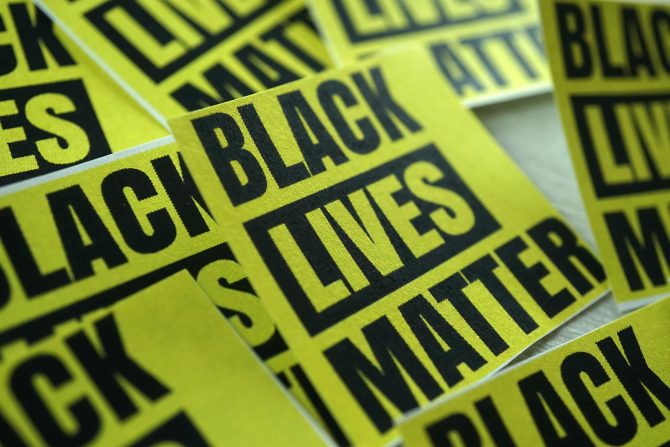Tina Thomas is the former Executive Director of Customer Experience at EPL.
Like the rest of the world, I watched the horrific murder of George Floyd, on the heels of the murders of both Ahmaud Arbery and Breonna Taylor, with shock and sadness. The global protests are shining light on overt and systematic racism that impacts all people of colour, with focus on the treatment of Black people. It’s calling attention to the issue that Black lives are in danger and that right now we must all work together to support change.

As a brown woman growing up in Edmonton, my experiences with racism are lived and real. I have been called a Paki and a monkey; told to go back to my country; been taunted by kids in my community; had neighbours that didn’t want to move into the house next to us (you know, the brown people will bring down their property value or contaminate them); been told I am not a real Canadian; had to endure conversations with well-intentioned, educated white people about how the academic bar needs to be lowered for people of colour to help us meet the requirements of higher education; surprised people with “how good my English is”; been hassled at borders; felt fearful to travel to cities and neighbourhoods where I knew simply being brown could put me in danger. The list is long. Racism isn’t theoretical for any person of colour — it’s real and happens every day.
My own personal experiences are one of the reasons I am proud to work at, and for, an institution and organization that is constantly working to be open and inclusive for all. EPL welcomes everyone no matter what they look like, where they come from or what they believe; and champions both knowledge and ideas through content and conversations. It doesn’t mean we can’t and shouldn’t be doing more and better. Earlier this year, our Board of Trustees approved EPL’s Diversity and Inclusion Policy and we are planning additional work including increasing the availability of open-access eBook and eAudiobook titles related to racism, adding more classes and events, as well as additional staff training. I look forward to the work that will continue.
Over the past week, we’ve created a list of great resources for both kids and adults to help educate ourselves and the public on what racism looks like, where it comes from and how we can do better. While many of these items are available digitally, not surprisingly, some of them have become extremely popular in the past few weeks as we are all trying to learn as much as we can. We're purchasing more digital copies of the most relevant and timely content to help ensure Edmontonians can access them as quickly as possible.
There are also great resources, videos, documentaries and articles you can read and watch right now. We have reviewed a few that are freely available on the internet and created a list for you to start with, until your library materials are available.
TED Talks
The danger of a single story
Chimamanda Ngozi Adichie illustrates both the challenges and limitations of reducing people to a single story defined by their colour, race, gender, sex, religion, political views and more.
We need to talk about injustice
Bryan Stevenson is a brilliant, persuasive and passionate speaker. He outlines how the history of slavery and the false narrative that people of color, particularly Black people, are inferior to whites, has resulted in the over-incarceration of Black men in the U.S.
Articles
Don’t Understand the Protests? What You’re Seeing is People on the Edge
Former NBA star Kareem Abdul-Jabbar shares his perspective on the history that has led to the current frustration and anger felt by Black people.
The American Nightmare
Ibram X. Kendi, anti-racist advocate, author and scholar, uses experiences and research to provide perspective on what it is like to be Black in America.
When Black People are in Pain White People Just Join Book Clubs
Author Tre Johnson is correct — when tragedy hits people read, listen and try to become informed. But the more important piece is what will we do next?
Racism Defined
An overview of the various terms used when talking about racism and oppression.
Unpacking the Invisible Knapsack
Anti-racism activist Peggy McIntosh’s work from 1989 still provides insights and value, outlining the numerous ways privilege is taken for granted and negatively impacts people of colour.
Letters to America from Black Canadians
Eight writers pen open letters to America addressing how racism persists in Canada.
We Need more White Parents to Talk to their Kids About Race. Especially Now
Chandra White-Cummings writes about the risk of white parents teaching their children to be "colourblind" and the shift that needs to happen. Now more than ever, white parents need to socialize their kids on race and look at life with a wider lens.
Documentaries
We are the Roots. Black Settlers and their Experiences of Discrimination on the Canadian Prairies
Through oral history and accounts from those who settled here, We are the Roots tells the story of a wave of African-American immigrants who moved to Alberta and Saskatchewan between 1905-1912 to escape racism and persecution in the U.S.
P.S. I can’t breathe
This documentary welcomes dialogue around racial inequality, policing and the Criminal Justice System by focusing on Eric Garners case.
Documenting Hate - Charlottesville
The first in a series of two films from Frontline and ProPublica that investigates and exposes the resurgence of white supremacists and Neo-Nazis involved in the 2017 Charlottesville rally.
EPL Streaming Video Services
You can also instantly access powerful and relevant documentaries through our streaming video services, a full list is available here.
When we know better we can do better right? So let’s do both.


Add a comment to: #BLM: 12 Online Resources to Learn about Racism